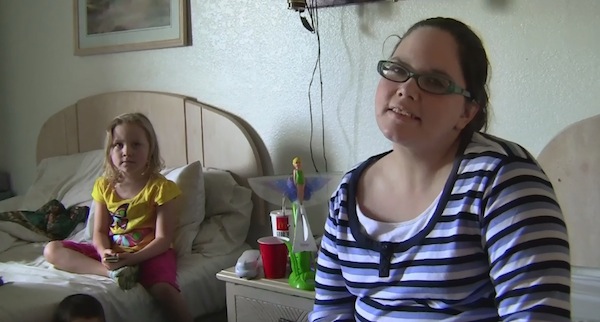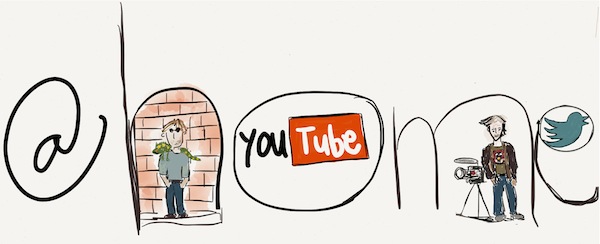Written by Haley Jo Lewis, Seattle University communications major and project assistant, Seattle University’s Project on Family Homelessness
If you had three wishes, what would they be?
Would you even think to wish for a home? Maybe a bigger one, perhaps, if you already have one.
While interviewing people who are homeless, social media pioneer and homelessness advocate Mark Horvath always ends his conversations with a question: “If you had three wishes, what would they be?”
In the new documentary about him, “@home,” the people Mark interviews, without fail, wish for a home.

A former television executive, Mark Horvath – also known as “@hardlynormal” – knows what it feels like to wish for a home; he experienced homelessness himself, twice. At one low point, he scraped together money by posing with his pet iguana for tourist photos.
In late 2008 Mark created the popular website InvisiblePeople.TV, which uses social media to share video stories of people all over America who are experiencing homelessness.
A few years ago, Mark embarked on a cross-country road trip to further document these stories, and director Susanne Suffredin followed him. Susanne is an accomplished documentary filmmaker who has worked on films like the Academy Award nominee “Hoop Dreams.” Upon meeting Mark, “I was struck by the passion and crazy energy of this guy and his crazy plan,” Susanne says. “He was going to end homelessness in this country and maybe even around the world. And he was going to do it using social media and YouTube.”
Susanne spent three years with Mark, creating the beautiful new film “@home,” a feature-length documentary that captures that crazy energy and passion of Mark’s determination to end homelessness. You can see it in Seattle May 2.
It’s an emotionally moving experience, to say the least. Watching “@home,” I was flooded with emotions. Seeing these people struggle on our doorsteps, and hearing them get the rare opportunity to tell their own stories…I itched for a change in the way we help people who are homeless.
“@home” documents Mark’s road trip – 11,000 miles across the country, filled with the stories of homeless men, women, and children. We see people whose lives have been turned upside down, and hear about their strength and survival. We meet former soccer moms, veterans, children; the faces of homelessness are not exclusive to any gender, age, or race.
We also see Mark’s impact on the social media community, such as his visit to Twitter headquarters in San Francisco, where he is something of a rock star.

Vulnerability in front of and behind the camera
Because of his vulnerability, compassion and determination – and his willingness to face his own demons – Mark gives us a unique understanding into homelessness from the front lines.

Watching “@home” can be rough at times. My heart broke at the story of a St. Louis mother, Jean, and her family of seven, living in a motel room. Despite their situation, they aim to remain positive. Jean says that anywhere her family can be together is home to them, as she begins to tear up.

After watching this film, my perspective on homelessness changed forever; I am filled with new hope that ending homelessness IS possible. Throughout the film, we’re shown not only personal stories but innovative approaches that show us success is within reach. I believe Mark. We can solve homelessness.
Social media pit stops in the homelessness landscape
Coupled with this documentary is Mark’s online presence. He has more than 20,000 followers on Twitter (@hardlynormal), and millions of people have viewed his YouTube channel.
The filmmakers use creative ways to blend Mark’s physical and virtual worlds. For example, throughout the film, we see snippets of his work on Twitter, as he reacts to the situation that we’ve just seen on film. His tweets, Facebook posts and Web site are like pit stops on this road trip, where social media is the guidebook to the landscape.

Believe it or not, Mark’s social media work has led to amazing changes in communities nationwide. In the film, we see a farm whose produce is donated in full to soup kitchens, and we meet people who were once homeless, but have since been housed – all of this because of work Mark has done, much of it online.
What’s more, because of his social media expertise, Mark is able to attract new advocates, people who may not have thought much about homelessness before.

“@home” is a documentary that made me feel, made me think, and gave me hope. There is something being done to help our fellow citizens escape the streets, and there are ways for us to help too. The end of homelessness will come if we work hard enough.
Like Mark says: “The number one thing I want people to know about homelessness is that we can solve it.”
Following Mark’s path to action
1. Attend a screening of “@home” and meet Mark in person:
Our project, as part of the Hack to End Homelessness, will host the Seattle premiere of “@home.” Mark Horvath and Susanne Suffredin are our special guests. Tickets are $15.
When: Friday, May 2, 7 p.m.
Where: Impact Hub Seattle in Pioneer Square, 220 2nd Ave S.
To learn more about Hack to End Homelessness and to buy tickets for the May 2 screening or the whole weekend, visit: http://www.hacktoendhomelessness.com
2. Request a screening:
Visit http://athomedocumentary.org/ to learn more about “@home,” watch clips, request your own screening – using the discussion guide our project has developed – and discover more ways to get involved in your community.
3. Join the movement on Twitter by following Mark and the “@home” campaign:
https://twitter.com/hardlynormal
https://twitter.com/invisiblepeople
https://twitter.com/@home_campaign
4. Follow Mark’s advocacy work on Facebook:
https://www.facebook.com/mhorvath
5. Witness and share the amazing stories on InvisiblePeople.TV:
http://invisiblepeople.tv/blog/
Are you following Mark Horvath? How has he influenced you?

Pingback: Local Story Behind Debut of “@home” on Chicago PBS Station | Seattle University Project on Family Homelessness()
Pingback: Can Social Media End Homelessness? A Look at New Research | Seattle University Project on Family Homelessness()